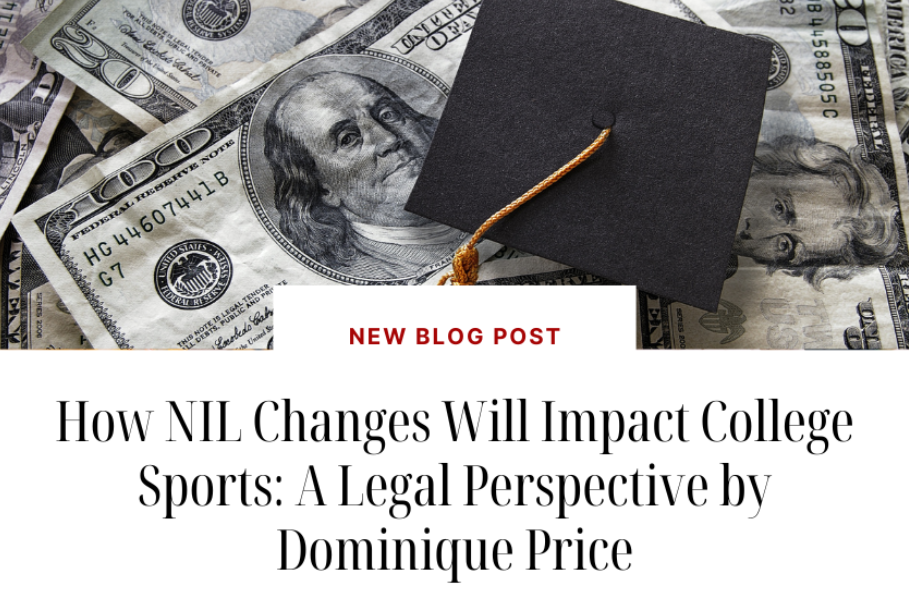How NIL Changes Will Impact College Sports: A Legal Perspective
Dominique Price

College sports have been a hot topic in recent years, with discussions around compensation for student-athletes and the role of antitrust laws in governing the industry. One of the most significant changes in college sports is the introduction of Name, Image, and Likeness (NIL) rights. This blog post will explore how NIL changes will impact college sports from a legal perspective.
If you're intrigued by the legal implications of NIL rights in college sports, don't miss the upcoming CLE at Acrisure Stadium, Home of the Pittsburgh Steelers, on June 7, 2024. This event is not just an opportunity but a necessity to advance your professional development and delve deeper into this complex topic. Register now at www.nbi-sems.com, enter Product ID# 98898, and save $50 when you use promo code FSPN50A at checkout. I'm bringing a special guest, a two-time NFL Champion, and former Steeler Trai Essex, who will help me moderate an engaging lunch Q&A about what it's like from a player and client perspective.
To begin with, it's worth understanding what NIL rights are. Put simply, these rights allow student-athletes to profit from their name, image, and likeness. If student-athletes are particularly popular, they can earn money by endorsing products, appearing in advertisements, or engaging in other similar activities.
Introducing NIL rights is a game-changer for student-athletes, offering them a fair opportunity to profit from their name, image, or likeness. Previously, they were barred from this, a rule often seen as unjust. The advent of NIL rights now rectifies this, empowering these athletes to leverage their popularity and earn compensation for their brand.
From a legal perspective, introducing NIL rights can raise several questions and concerns. One of the primary issues is the potential impact on antitrust laws. In particular, there is a concern that allowing student-athletes to profit from their name, image, and likeness could lead to a situation where certain schools or conferences have an unfair advantage. In other words, the deeper the pockets, the more opportunities to woo top talents to their universities.
Another issue is the potential impact on existing contracts and agreements. For example, many colleges and universities have contracts with companies that provide uniforms, beverages, or other equipment. If student-athletes can now endorse products, it could conflict with these existing agreements.
Despite the potential challenges, the introduction of NIL rights heralds a new era for college sports. It not only allows student-athletes to benefit from their hard work, a concept many consider just, but it also fosters new collaborations between businesses, individuals, and these athletes. This synergy could bring about fresh opportunities and dynamics, potentially fueling the growth and evolution of the college sports industry, a prospect that inspires optimism for the future.
The Name, Image, and Likeness (NIL) landscape profoundly reshapes the dynamics of both NCAA and professional sports. For collegiate athletes, NIL agreements have introduced new considerations for draft prospects, influencing their marketability and decision-making about entering professional leagues. Understanding these changes can help you better advise your clients and navigate the evolving sports industry.
In professional sports, the ripple effects of NIL extend to veteran contracts as well, as teams now factor in an athlete's marketability and potential endorsement earnings when negotiating terms. This shift alters the financial landscape for individual athletes and affects team strategies, salary cap management, and the broader economic framework of leagues. The introduction of NIL rights creates more opportunities for athletes while simultaneously challenging traditional norms and practices within sports organizations.
In conclusion, introducing NIL rights is a significant change in college sports, with both positive and negative implications. Legally speaking, there are concerns about the impact on antitrust laws and existing contracts. However, this change is long overdue and will benefit student-athletes and businesses in the long run. The Acrisure CLE is a timely opportunity to delve more into these changes and discuss topics such as States vs. NCAA in the pre-and post-NIL eras, among other case law precedents being debated.
Just ten years ago, we couldn't fathom having this discussion, but now it is the time! This CLE is great for attorneys in all practice areas, litigation managers, paralegals, and other legal professionals. What topics would you like to see us discuss around NIL? With the future of sports in mind…we hope to see you there!
CLE at Acrisure Stadium: Home of the Pittsburgh Steelers
Event: Continuing Legal Education Seminar
Date: Friday, June 7th 2024
Time: 9:00am to 4:30pm EST
Location: Acrisure Stadium, Pittsburgh, PA
About NBI
We’re National Business Institute, and our passion is Continuing Legal Education! We have been providing quality training to attorneys, accountants, HR professionals, teachers and others since 1983. In the transition to online training, NBI has remained an industry leader. We offer numerous online formats, as well as subscription options for individuals and for legal teams.
This blog post is for general informative purposes only and should not be construed as legal advice or a solicitation to provide legal services. You should consult with an attorney before you rely on this information. While we attempted to ensure accuracy, completeness and timeliness, we assume no responsibility for this post’s accuracy, completeness or timeliness.
